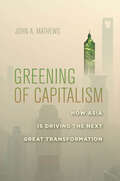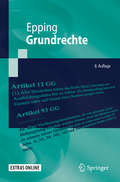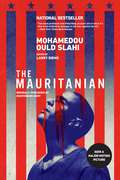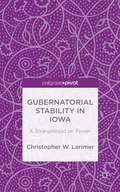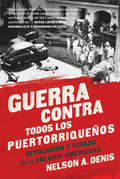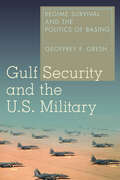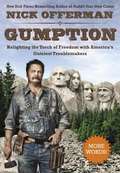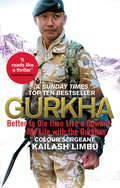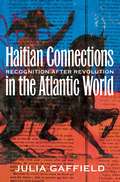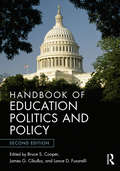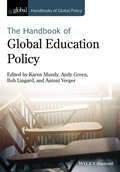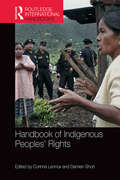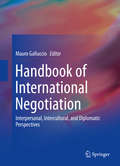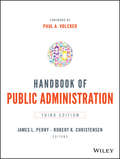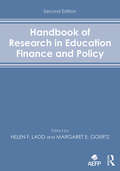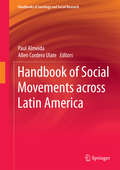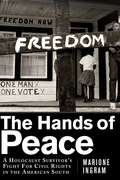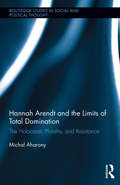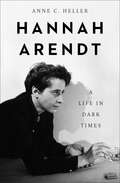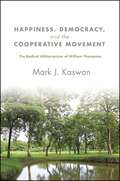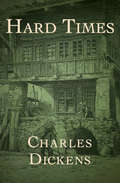- Table View
- List View
Greening of Capitalism: How Asia Is Driving the Next Great Transformation
by John A. MathewsAs China, India, and other industrializing giants grow, they are confronted with an inconvenient truth: They cannot rely on the conventions of capitalism as we know them today. Western industrialism has achieved miracles, promoting unprecedented levels of prosperity and raising hundreds of millions out of poverty. Yet, if allowed to proceed unencumbered, this paradigm will do irreversible harm to the planet. By necessity, a new approach to environmentally conscious development is already emerging in the East, with China leading the way. Positioning its argument against zero-growth advocates and free-market environmentalists, Greening of Capitalism charts this transformation and sketches out a framework for more sustainable capitalism. State-mandated changes in energy use (as opposed to carbon taxes), a circular flow of resources (as opposed to emissions standards), and the introduction of new financial instruments that support green growth are cornerstones of China's framework. John A. Mathews argues that these tenets will be emulated around the world—first in India and Brazil. In light of this emerging shift, Mathews considers core debates over national security, international relations, and economic policy, ultimately addressing the question of whether these measures will be far-reaching or timely enough to prevent further damage.
Grundrechte (Springer-Lehrbuch)
by Volker EppingDieses Lehrbuch richtet sich an Studierende, die entweder einen Einstieg in den Bereich der Grundrechte suchen oder aber die Grundrechte zwecks Vorbereitung auf die Übungen bzw. das Staatsexamen wiederholen möchten. Das Werk ist konsequent auf die Anforderungen zugeschnitten, mit denen Studierende in Klausuren, Haus- und Studienarbeiten konfrontiert werden. Alle Grundrechte mitsamt ihren europarechtlichen Bezügen sowie die prüfungsrelevanten Grundzüge der Verfassungsbeschwerde werden ausgehend vom Verfassungstext systematisch erschlossen. Die allgemeinen Grundrechtslehren, die in ihrer Abstraktheit gerade für den Einsteiger häufig nur schwer verständlich sind, werden nicht "vor die Klammer" gezogen, sondern am Beispiel einzelner Grundrechte behandelt. Zum besseren Verständnis gibt das Buch außerdem die zentralen Entscheidungen des BVerfG in den relevanten Auszügen wieder. Beispielsfälle, deren Lösungen über das Internet bereitgestellt werden, sowie Zusammenstellungen typischer Klausurprobleme runden das Lehrbuch ab.
Guantánamo Diary
by Larry Siems Mohamedou Ould SlahiAn unprecedented international publishing event: the first and only diary written by a still-imprisoned Guantánamo detainee.Since 2002, Mohamedou Slahi has been imprisoned at the detention camp at Guantánamo Bay, Cuba. In all these years, the United States has never charged him with a crime. A federal judge ordered his release in March 2010, but the U.S. government fought that decision, and there is no sign that the United States plans to let him go.Three years into his captivity Slahi began a diary, recounting his life before he disappeared into U.S. custody, "his endless world tour" of imprisonment and interrogation, and his daily life as a Guantánamo prisoner. His diary is not merely a vivid record of a miscarriage of justice, but a deeply personal memoir---terrifying, darkly humorous, and surprisingly gracious. Published now for the first time, GUANTÁNAMO DIARY is a document of immense historical importance and a riveting and profoundly revealing read.
Gubernatorial Stability in Iowa: A Stranglehold On Power
by Christopher LarimerThis book uses a multi-method approach to explain why recent Iowa governors have been able to stay in office significantly longer than their peers. Voters in Iowa value a personal connection with their governor and those governors who ignore that expectation are held accountable at the polls.
Guerra Contra Todos Los Puertorriqueños: Revolución Y Terror En La Colonia Americana
by Nelson A. Denis"Prepárese para ser enfurecido. Una lectura obligada y reveladora. " --Robert Domínguez, New York Daily News En 1950, después de cincuenta años de ocupación militar y gobierno colonial, el Partido Nacionalista de Puerto Rico montó una fallida revolución armada contra Estados Unidos. La violencia arraso con la isla: comandos nacionalistas fueron enviados a Washington a ajusticiar al presidente Harry Truman, se desataron tiroteos en ocho municipios, se incendiaron cuarteles policiacos y oficinas de correo. Para sofocar esta insurrección, el Ejército de Estados Unidos desplegó miles de tropas y ametralló dos pueblos desde el aire, marcando la primera vez en su historia que el gobierno estadounidense atacó de esta forma a sus propios ciudadanos. Por medio de narraciones orales, entrevistas personales, relatos de testigos oculares, testimonios del Congreso de Estados Unidos y archivos recientemente liberados al público por el FBI, Guerra Contra Todos los Puertorriqueños nos relata la historia de una revolución olvidada y su contexto en la historia grande de Puerto Rico, desde la invasión estadounidense de 1898 hasta la lucha actual por la plena autodeterminación de los puertorriqueños.
Guides to the Coinage of the Ancient World: The Hellenistic World
by Peter ThonemannCoinage is one of our key sources for the rich and fascinating history of the Hellenistic world (323–31 BC). This book provides students of the period with an up-to-date introduction to Hellenistic gold, silver and bronze coins in their cultural and economic contexts. It also offers new perspectives on four major themes in contemporary Hellenistic history: globalisation, identity, political economy and ideology. With more than 250 illustrations, and written in a lucid and accessible style, this book sheds new light on the diverse and multicultural societies of the Hellenistic world, from Alexander to Augustus. The author assumes no prior knowledge of Hellenistic history, and all Greek and Latin texts are translated throughout.
Gulf Security and the U.S. Military: Regime Survival and the Politics of Basing
by Geoffrey F. GreshThe U. S. military maintains a significant presence across the Arabian Peninsula but it must now confront a new and emerging dynamic as most Gulf Cooperation Council countries have begun to diversify their political, economic, and security partnerships with countries other than the United States--with many turning to ascending powers such as China, Russia, and India. For Gulf Arab monarchies, the choice of security partner is made more complicated by increased domestic and regional instability stemming in part from Iraq, Syria, and a menacing Iran: factors that threaten to alter totally the Gulf's current security dynamic. Understanding the dynamics of base politicization in a Gulf host nation--or any other--is therefore vitally important for the U. S. today. Gulf National Security and the U. S. Military examines both Gulf Arab national security and U. S. military basing relations with Gulf Arab monarchy hosts from the Second World War to the present day. Three in-depth country cases--Saudi Arabia, Bahrain, and Oman--help explain the important questions posed by the author regarding when and why a host nation either terminated a U. S. military basing presence or granted U. S. military basing access. The analysis of the cases offers a fresh perspective on how the United States has adapted to sometimes rapidly shifting regional security dynamics and factors that influence a host nation's preference for eviction or renegotiation, based on its perception of internal versus external threats.
Gumption
by Nick OffermanThe star of Parks and Recreation and author of the New York Times bestseller Paddle Your Own Canoe returns with a second book that humorously highlights twenty-one figures from our nation's history, from her inception to present day--Nick's personal pantheon of "great Americans."To millions of people, Nick Offerman is America. Both Nick and his character, Ron Swanson, are known for their humor and patriotism in equal measure.After the great success of his autobiography, Paddle Your Own Canoe, Offerman now focuses on the lives of those who inspired him. From George Washington to Willie Nelson, he describes twenty-one heroic figures and why they inspire in him such great meaning. He'll combine both serious history with light-hearted humor--comparing, say, George Washington's wooden teeth to his own experience as a woodworker. The subject matter will also allow Offerman to expound upon his favorite topics, which readers love to hear--areas such as religion, politics, woodworking and handcrafting, agriculture, creativity, philosophy, fashion, and, of course, meat.From the Hardcover edition.
Gumption: Relighting the Torch of Freedom with America's Gutsiest Troublemakers
by Nick OffermanThe star of Parks and Recreation and author of the New York Times bestseller Paddle Your Own Canoe returns with a second book that humorously highlights twenty-one figures from our nation's history, from her inception to present day--Nick's personal pantheon of "great Americans."To millions of people, Nick Offerman is America. Both Nick and his character, Ron Swanson, are known for their humor and patriotism in equal measure.After the great success of his autobiography, Paddle Your Own Canoe, Offerman now focuses on the lives of those who inspired him. From George Washington to Willie Nelson, he describes twenty-one heroic figures and why they inspire in him such great meaning. He combines both serious history with light-hearted humor--comparing, say, Benjamin Franklin's abstinence from daytime drinking to his own sage refusal to join his construction crew in getting plastered on the way to work. The subject matter also allows Offerman to expound upon his favorite topics, which readers love to hear--areas such as religion, politics, woodworking and handcrafting, agriculture, creativity, philosophy, fashion, and, of course, meat.From the Hardcover edition.
Gurkha: Better to Die than Live a Coward: My Life in the Gurkhas
by Colour-Sergeant Kailash LimbuIn this Sunday Times Top Ten bestselling memoir that 'reads like a thriller', (Joanna Lumley) Colour-Sargent Kailash Limbu shares a riveting account of his life as a Gurkha soldier-marking the first time in its two-hundred-year history that a soldier of the Brigade of Gurkhas has been given permission to tell his story in his own words.In the summer of 2006, Colour-Sargeant Kailash Limbu's platoon was sent to relieve and occupy a police compound in the town of Now Zad in Helmand. He was told to prepare for a forty-eight hour operation. In the end, he and his men were under siege for thirty-one days - one of the longest such sieges in the whole of the Afghan campaign.Kailash Limbu recalls the terrifying and exciting details of those thirty-one days - in which they killed an estimated one hundred Taliban fighters - and intersperses them with the story of his own life as a villager from the Himalayas. He grew up in a place without roads or electricity and didn't see a car until he was fifteen.Kailash's descriptions of Gurkha training and rituals - including how to use the lethal Kukri knife - are eye-opening and fascinating. They combine with the story of his time in Helmand to create a unique account of one man's life as a Gurkha. 'I was completely bowled over by Kailash's book and read it with a beating heart and dry mouth. I felt as though I was at his side, hearing the shells and bullets, enjoying the jokes and listening in the scary dead of night. The skill with which he has included his childhood and training is immense, always discovered with ease in the narrative: it actually felt as though I was watching, was IN a film with him. It brought me nearer than I have ever been not only to the mind of the universal soldier but to a hill boy of Nepal and a hugely impressive Gurkha. I raced through it and couldn't put it down: it reads like a thriller. If you want to know anything about the Gurkhas, read this book, and be prepared for a thrilling and dangerous trip' Joanna Lumley
Haitian Connections in the Atlantic World
by Julia GaffieldOn January 1, 1804, Haiti shocked the world by declaring independence. Historians have long portrayed Haiti's postrevolutionary period as one during which the international community rejected Haiti's Declaration of Independence and adopted a policy of isolation designed to contain the impact of the world's only successful slave revolution. Julia Gaffield, however, anchors a fresh vision of Haiti's first tentative years of independence to its relationships with other nations and empires and reveals the surprising limits of the country's supposed isolation.Gaffield frames Haitian independence as both a practical and an intellectual challenge to powerful ideologies of racial hierarchy and slavery, national sovereignty, and trade practice. Yet that very independence offered a new arena in which imperial powers competed for advantages with respect to military strategy, economic expansion, and international law. In dealing with such concerns, foreign governments, merchants, abolitionists, and others provided openings that were seized by early Haitian leaders who were eager to negotiate new economic and political relationships. Although full political acceptance was slow to come, economic recognition was extended by degrees to Haiti--and this had diplomatic implications. Gaffield's account of Haitian history highlights how this layered recognition sustained Haitian independence.
Hamilton versus Jefferson in the Washington Administration
by Carson HollowayBy the middle of 1792, just a little more than three years after America's new government under the Constitution had been set in motion, Alexander Hamilton and Thomas Jefferson - President George Washington's two most important cabinet secretaries and two of the most eminent men among the American founders - had become open and bitter political enemies. Their dispute was not personal but political in the highest sense. Each believed that the debate between them was over regime principles. Each believed that he was protecting the newly established republic, and that the other was laboring to destroy it. Carson Holloway's Hamilton versus Jefferson in the Washington Administration examines Hamilton and Jefferson's differences, seeking to explain why these great founders came to disagree so profoundly and vehemently about the political project to which both were committed and had dedicated so much thought and effort.
Handbook of Education Politics and Policy
by Bruce S. Cooper James G. Cibulka Lance D. FusarelliThis revised edition of the Handbook of Education Politics and Policy presents the latest research and theory on the most important topics within the field of the politics of education. Well-known scholars in the fields of school leadership, politics, policy, law, finance, and educational reform examine the institutional backdrop to our educational system, the political behaviors and cultural influences operating within schools, and the ideological and philosophical positions that frame discussions of educational equity and reform. In its second edition, this comprehensive handbook has been updated to capture recent developments in the politics of education, including Race to the Top and the Common Core State Standards, and to address the changing role politics play in shaping and influencing school policy and reform. Detailed discussions of key topics touch upon important themes in educational politics, helping leaders understand issues of innovation, teacher evaluation, tensions between state and federal lawmakers over new reforms and testing, and how to increase student achievement. Chapter authors also provide suggestions for improving the political behaviors of key educational groups and individuals with the hope that an understanding of political goals, governance processes, and policy outcomes may contribute to ongoing school reform.
Handbook of Global Education Policy (Handbooks of Global Policy)
by Andy Green Karen Mundy Bob Lingard Antoni VergerThis innovative new handbook offers a comprehensive overview of the ways in which domestic education policy is framed and influenced by global institutions and actors. Surveys current debates about the role of education in a global polity, highlights key transnational policy actors, accessibly introduces research methodologies, and outlines global agendas for education reform Includes contributions from an international cast of established and emerging scholars at the forefront of the field thoughtfully edited and organized by a team of world-renowned global education policy experts Each section features a thorough introduction designed to facilitate readers’ understanding of the subsequent material and highlight links to interdisciplinary global policy scholarship Written in an accessible and engaging style that will appeal to domestic and international policy practitioners, social scientists, and education scholars alike
Handbook of Indigenous Peoples' Rights (Routledge International Handbooks Ser.)
by Corinne Lennox Damien ShortThis handbook will be a comprehensive interdisciplinary overview of indigenous peoples’ rights. Chapters by experts in the field will examine legal, philosophical, sociological and political issues, addressing a wide range of themes at the heart of debates on the rights of indigenous peoples. The book will address not only the major questions, such as ‘who are indigenous peoples? What is distinctive about their rights? How are their rights constructed and protected? What is the relationship between national indigenous rights regimes and international norms? but also themes such as culture, identity, genocide, globalization and development, rights institutionalization and the environment.
Handbook of International Negotiation
by Mauro GalluccioThis book reinforces the foundation of a new field of studies and research in the intersection between social sciences and specifically between political science, international relations, diplomacy, psychotherapy, and social-cognitive psychology. It seeks to promote a coherent and comprehensive approach to international negotiation from a multidisciplinary viewpoint generating a longer term of studies, researches, and networking process that both respond to changes and differences in our societies and to the unprecedented demand and opportunities for international conflict prevention and resolution. There is a need to increase cooperation, coherence, and efficiency of international negotiation. It is necessary to focus our shared attention on new ways to better formulate integrated and sustainable negotiating strategies for conflict resolution. This book acquires innovative relevance in and will impact on the new context of international challenges which do not have a one-off solution that can be settled through a single target-oriented negotiation process. The book brings together leading scholars and researchers into the field from different disciplines, diplomats, politicians, senior officials, and even a Cardinal of the Holy See to give their contributions and make proposals on how best to optimize the use of negotiation and diplomacy structures, tools, and instruments. However, unlike most studies and researches on international negotiation, this book emphasizes processes, not simply outcomes or even tools but the way in which tools are and can be used to achieve better outcomes in international reality-based negotiation.
Handbook of Public Administration
by Robert K. Christensen James L. PerryThe fundamentals of public administration, from the world's leading practitionersHandbook of Public Administration is the classic, comprehensive guide to the field, featuring original writings from the world's foremost public administration thought leaders and practitioners. Intended to help both public administration students and practitioners navigate administrative challenges, overcome obstacles, and improve effectiveness, this guide provides a complete overview of the entire field. The information is organized into seven parts representing key domains of knowledge and practice that are essential for effective public administration. These reflect changes in the state of modern public administration, the factors that influence policies and programs, the mechanics of how government works, and the tools that help administrators get things done. Readers will find insightful discussions on the challenges of contemporary governance and the ethics of public administration, as well as practical guidance on the everyday operations that bring effective policies and programs to life.Students and experienced practitioners alike will appreciate the well-rounded approach to issues public administrators face every day. The book is complete enough to act as a text, but organized logically for quick reference for specific problems or situations. Readers will:Understand the challenges posed by the changing context of public administrationExplore how relationships and decisions influence public policies and programsLearn the critical skills and tools public administrators must master to be effectiveExplore the ethics and liabilities of public administration, and what it means to take partThe role of public administration is evolving, and the changing nature of the field will impact the way policies and programs are designed and implemented. This book fully explores current and upcoming changes domestically and internationally against the backdrop of public administration fundamentals. For the student or professional seeking a deeper understanding of the public administrator's role, Handbook of Public Administration is a clear, comprehensive resource.
Handbook of Research in Education Finance and Policy
by Helen F. Ladd Margaret E. GoertzSponsored by the Association for Education Finance and Policy (AEFP), the second edition of this groundbreaking handbook assembles in one place the existing research-based knowledge in education finance and policy, with particular attention to elementary and secondary education. Chapters from the first edition have been fully updated and revised to reflect current developments, new policies, and recent research. With new chapters on teacher evaluation, alternatives to traditional public schooling, and cost-benefit analysis, this volume provides a readily available current resource for anyone involved in education finance and policy. The Handbook of Research in Education Finance and Policy traces the evolution of the field from its initial focus on school inputs and revenue sources used to finance these inputs, to a focus on educational outcomes and the larger policies used to achieve them. Chapters show how decision making in school finance inevitably interacts with decisions about governance, accountability, equity, privatization, and other areas of education policy. Because a full understanding of important contemporary issues requires inputs from a variety of perspectives, the Handbook draws on contributors from a number of disciplines. Although many of the chapters cover complex, state-of-the-art empirical research, the authors explain key concepts in language that non-specialists can understand. This comprehensive, balanced, and accessible resource provides a wealth of factual information, data, and wisdom to help educators improve the quality of education in the United States.
Handbook of Social Movements across Latin America
by Paul Almeida Allen Cordero UlateThis handbook covers social movement activities in Latin American countries that have had profound consequences on the political culture of the region. It examines the developments of the past twenty years, such as a renewed upswing in popular mobilization, the ending of violent conflicts and military governments, new struggles and a relatively more democratic climate. It shows that, from southern Chiapas to Argentina, social movements in the 1990s and especially in the 2000s, have reached new heights of popular participation. There is a lack of research on the politics of this region in the contemporary era of globalization, this volume partially fills the void and offers a rich resource to students, scholars and the general public in terms of understanding the politics of mass mobilization in the early twenty-first century. The contributors each address social movement activity in their own nation and together they present a multidisciplinary perspective on the topic. Each chapter uses a case study design to bring out the most prominent attributes of the particular social struggle(s), for instance the main protagonists in the campaigns, the grievances of the population and the outcomes of the struggles. This Handbook is divided into seven substantive themes, providing overall coherence to a broad range of social conflicts across countries, issues and social groups. These themes include: 1) theory of Latin American social movements; 2) neoliberalism; 3) indigenous struggles; 4) women's movements; 5) movements and the State; 6) environmental movements; and 7) transnational mobilizations.
Hands of Peace: A Holocaust Survivor?s Fight for Civil Rights in the American South
by Marione Ingram Thelton HendersonBorn in Hamburg in the 1930s, Marione Ingram fled Nazi Germany, only to find racism as pervasive in the American South as anti-Semitism was in Europe. Marione moved first to New York and then to Washington, D. C. where, in 1960, she joined the Congress of Racial Equality, protesting discrimination in housing, employment, education, and other aspects of life in the nation's capital, including the denial of voting rights. In D. C. , Marione made a name for herself as a freedom fighter. She was a volunteer for the March on Washington and an organizer of an extended sit-in to support the Mississippi Freedom Party. A year later, at the urging of civil rights leader Fannie Lou Hamer, Marione went south to Mississippi. She was part of a coalition to end segregation and extend civil rights to African Americans--and she was uncompromising in her demand for equality. In Mississippi, Marione became a leader of the Student Nonviolent Coordinating Committee, as well as an educator at one of the country’s most influential Freedom Schools. The school was one of the targets of the Ku Klux Klan. When they burned a cross in front of it, she painted the word "FREEDOM" in bold letters on the charred crossbar, creating an icon in the struggle for equal rights. As a white woman and a Holocaust refugee, Marione was the most unlikely of heroes in the fight for civil rights for African Americans. This is her empowering story--a tale of courage, strength, and determination.
Hannah Arendt and the Limits of Total Domination: The Holocaust, Plurality, and Resistance (Routledge Studies in Social and Political Thought)
by Michal AharonyResponding to the increasingly influential role of Hannah Arendt’s political philosophy in recent years, Hannah Arendt and the Limits of Total Domination: The Holocaust, Plurality, and Resistance, critically engages with Arendt’s understanding of totalitarianism. According to Arendt, the main goal of totalitarianism was total domination; namely, the virtual eradication of human legality, morality, individuality, and plurality. This attempt, in her view, was most fully realized in the concentration camps, which served as the major "laboratories" for the regime. While Arendt focused on the perpetrators’ logic and drive, Michal Aharony examines the perspectives and experiences of the victims and their ability to resist such an experiment. The first book-length study to juxtapose Arendt’s concept of total domination with actual testimonies of Holocaust survivors, this book calls for methodological pluralism and the integration of the voices and narratives of the actors in the construction of political concepts and theoretical systems. To achieve this, Aharony engages with both well-known and non-canonical intellectuals and writers who survived Auschwitz and Buchenwald concentration camps. Additionally, she analyzes the oral testimonies of survivors who are largely unknown, drawing from interviews conducted in Israel and in the U.S., as well as from videotaped interviews from archives around the world. Revealing various manifestations of unarmed resistance in the camps, this study demonstrates the persistence of morality and free agency even under the most extreme and de-humanizing conditions, while cautiously suggesting that absolute domination is never as absolute as it claims or wishes to be. Scholars of political philosophy, political science, history, and Holocaust studies will find this an original and compelling book.
Hannah Arendt: A Life in Dark Times
by Anne C HellerThe acclaimed biographer presents &“a perceptive life of the controversial political philosopher&” and author of Eichmann in Jerusalem (Kirkus Reviews). Hannah Arendt was a polarizing cultural theorist—extolled by her peers as a visionary and berated by her critics as a poseur and a fraud. Born in Prussia to assimilated Jewish parents, she escaped from Hitler&’s Germany in 1933. Arendt is now best remembered for the storm of controversy that surrounded her 1963 New Yorker series on the trial of Adolf Eichmann, a kidnapped Nazi war criminal. Arendt&’s first book, The Origins of Totalitarianism, single-handedly altered the way generations around the world viewed fascism and genocide. Her most famous work, Eichmann in Jerusalem, created fierce debate that continues to this day, exacerbated by the posthumous discovery that she had been the lover of the philosopher and Nazi sympathizer Martin Heidegger. In this comprehensive biography, Anne C. Heller tracks the source of Arendt&’s contradictions and achievements to her sense of being a &“conscious pariah&”—one of those rare people who doesn&’t &“lose confidence in ourselves if society does not approve us&” and will not &“pay any price&” to gain the acceptance of others.
Happily Ever After: Companion to the Selection Series (The Selection Novella)
by Kiera CassMeet Prince Maxon before he fell in love with America, and a girl named Amberly before she became queen. See the Selection through the eyes of a guard who watched his first love drift away and a girl who fell for a boy who wasn't the prince. This gorgeous collection features four novellas from the captivating world of Kiera Cass's #1 New York Times bestselling Selection series, as well as exclusive, never-before-seen bonus content.This series companion is a must-have for any Selection fan, and includes: The Prince The Guard The Queen The Favorite Exclusive new scenes from The Selection, The Elite, and The One Introductions to each novella from Kiera Cass A map of Illéa and other illustrations And more!
Happiness, Democracy, and the Cooperative Movement: The Radical Utilitarianism of William Thompson (SUNY series in New Political Science)
by Mark J. KaswanHappiness is political. The way we think about happiness affects what we do, how we relate to other people and the world around us, our moral principles, and even our ideas about how society should be organized. Utilitarianism, a political theory based on hedonistic and individualistic ideas of happiness, has been dominated for more than two-hundred years by its founder, Jeremy Bentham. In Happiness, Democracy, and the Cooperative Movement, Mark J. Kaswan examines the work of William Thompson, a friend of Bentham's who nonetheless offers a very different utilitarian philosophy and political theory based on a different conception of happiness, but whose work has been largely overlooked. Kaswan reveals the importance of our ideas about happiness for our understanding of the basic principles and nature of democracy, its role in society and its character as a social institution. In what is the closest examination of Thompson's political theory to date, Kaswan moves from philosophy to theory to practice, starting with conceptions of happiness before moving to theories of utility, then to democratic theory, and finally to practice in the first detailed account of how Thompson's ideas laid the foundations for the cooperative movement, which is now the world's largest democratic social movement.
Hard Times: And Other Stories
by Charles DickensCharles Dickens&’s moral tale of utilitarian values run amok The industrial burg of Coketown is dominated by the philosophy of utilitarianism. The mill is the center of commerce. Students in the school are instructed to recite rote facts and figures while repressing any creative instincts. Thomas Gradgrind, the school superintendent, is a strict devotee of practicality and has raised his children, Tom and Louisa, according to this philosophy. It is only Sissy Jupe, a circus girl taken in by the Gradgrinds, who possesses the vision and wonderment to see past the rigid boundaries of cold, hard facts. A paean to the human spirit, Hard Times is among Dickens&’s most cutting works of social commentary. This ebook has been professionally proofread to ensure accuracy and readability on all devices.
